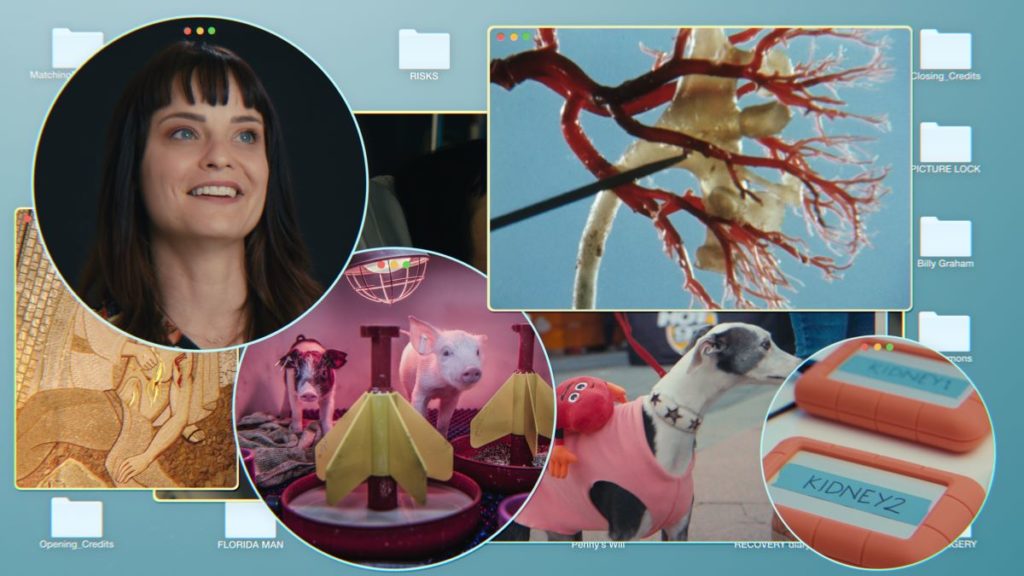
Few currently working documentary filmmakers possess a voice quite as distinct as Penny Lane. Her films tend to examine quirks of human psychology, from the mysterious, maybe-psychological disease Morgellons (as in 2018’s The Pain of Others) to the equally inscrutable popularity of smooth jazz (2021’s Listening to Kenny G), with a wry humor which never verges into the exploitative thanks to Lane’s clear and genuine curiosity. Lane’s voice is so clear, in fact, that I was surprised to realize halfway through that her new film, Confessions of a Good Samaritan, is the first in which she actually appears on camera as her own narrator/protagonist. This development is a natural one for her work, and the film is perhaps her most breezily accessible to date– despite heavy subject matter which, essentially, can be applied to every person watching it.
The inciting incident of Good Samaritan is an entirely personal one: Lane, nearing her forties and reflecting upon the remarkable good fortune of her life, decides to anonymously donate one of her kidneys to an unknown recipient. This act, known as “altruistic donation,” is a surprisingly new phenomenon; as Lane illustrates, it was almost entirely unheard of until 1999, when an Indiana woman named Joyce Roush Mason made headlines with her seemingly eccentric act of generosity. Since then, the practice has made gains in mainstream acceptance, but it’s still often greeted with skepticism and mistrust: why would one go to such great lengths to help a total stranger?
Confessions of a Good Samaritan provides a good deal of background on the history of organ transplantation (which I was surprised to learn only really dates back to the 1950s), but its primary focus is on an organ which cannot (yet) be transplanted: the brain, and Lane’s in particular. In a series of on-camera confessionals and diary entries, Lane attempts to navigate her own complicated feelings about her impending operation, which range from defiant righteousness (“Why doesn’t everyone do this?”) to doubts of her own sanity and fears for her mortality (in one of the most relatable moments, she admits to breaking down upon realizing that she’ll need to make plans for her cat in case anything goes awry in the procedure). To get to the bottom of her own feelings, Lane interviews several other altruistic donors (noting in particular their strangely beatific smiles), as well as assorted doctors, researchers, and activists in the field. At one point, Lane even goes so far as to film her own brainscan, in search of the enlarged amygdala which supposedly indicates a particularly compassionate individual. Thousands of filmmakers have striven to bring the audience inside their own brain, but Lane may be the first to actually do it.
On paper, all of this would seem to have the makings of a NOVA special, but that’s not quite the game Lane is playing here. This story is based on science, but it’s primarily concerned with the intangibility of why we do the things we do. Even the experts on hand are a few ticks dreamier than one might expect; consider the psychological researcher (apparently one of the few in the country primarily focused on the science of altruism) who is at her most passionate when she’s describing a near-death experience of her youth, or imagining what’s going through her dog’s mind when he meets a new person. The questions at hand likely don’t have concrete answers– which, by definition, means they’re probably the most interesting ones to ask.
Even when they’ve been constructed entirely of found footage (as in The Pain of Others or her debut, Our Nixon), Lane’s films have always been built around her own inquisitive nature, and here the director proves to be just as commanding a presence in front of the camera. Lane is a winning protagonist, by turns amusingly self-deprecating and affectingly confessional. She at times seems to struggle to articulate what exactly she’s feeling– that’s what the movie is for, after all– but, in that struggle, she is magnitudes more relatable than any number of hosts and monologists who posit themselves as “experts.” In her Q&A after the film at the Brattle, Lane described the experience of being her own subject as an understandably nerve-racking one (could you stand watching hours and hours of footage of yourself talking, over and over again, over the course of several years?). Time will tell whether Lane continues to “anchor” her own films, but I hope she does; like Werner Herzog or Agnes Varda, she is as engaging and entertaining as any number of fictional protagonists.
There will be some who find Good Samaritan overly twee or navel-gazey, and it is at times a hair too mannered (a framing device of a cursor opening the film’s various clips and images is more clever than resonant). But this is a far more thorny and complicated film than it may at first appear; consider, for example, the film’s coda, which leans more into is-that-all-there-is wistfulness than triumphant good-for-me-ism (though, to be clear, the opinion of the film is that altruistic donation is good and that more people should do it). Confessions of a Good Samaritan does not answer the question of why people do or don’t give organs– Lane would probably be in the running for a Nobel if it did– but it’s as funny, fascinating, and heartfelt a doc as you’re likely to see.
Confessions of a Good Samaritan
2023
dir. Penny Lane
105 min.
Part of the 2023 Independent Film Festival Boston – watch this space for the Hassle’s continuing festival coverage!

